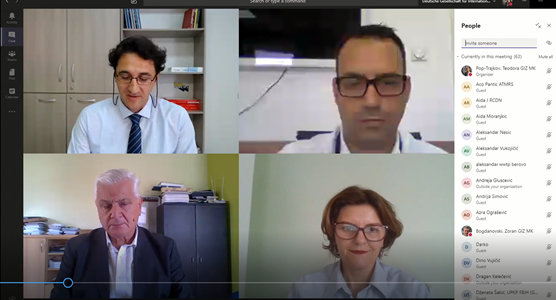
“Financial aspects of managing water and sanitation services during COVID-19” was the topic of the webinar organised on 9 June 2020, with over 60 participants from Bosnia and Herzegovina, Montenegro, North Macedonia and Serbia, within the Regional Capacity Development Program for Water and Sanitation Services (RCDN).
Participants concluded that the operation of water utilities during the COVID-19 pandemic is characterised by extra tasks, decreased collection rate and change in service demand. Appropriate methodology for calculating and covering the real costs resulting from the pandemic needs to be defined and support by the local government units needs to be ensured in that regard.
Mr. Miodrag Kolić, NALAS Project Manager and RCDN Quality Manager moderated the webinar and the keynote speakers were: Ms. Andreja Gluščević, RCDN Focal Point from UTVSI in Serbia, Mr. Filip Makrid, Director of Podgorica Water Utility in Montenegro, Mr. Aco Pantić, Secretary General of the Association of Municipalities and Towns of Republic of Srpska, Bosnia and Herzegovina and Mr. Todor Efremov, Secretary of Kavadarci Municipality in North Macedonia.

Ms. Andreja Gluščević presented the results of the survey conducted by UTVSI, based on input from 76 local government units in Serbia. The survey showed significant decrease in the collection rate during March and April 2020 in comparison with the same period last year as well as different patterns of water consumption distribution between industry and households during the pandemic. Almost 80% of the interviewees reported extended scope of work that was not planned and 60% of them reported decrease in planned activities such as water meter reading and replacement.

Mr. Filip Makrid highlighted that Podgorica Water Utility used the crisis to successfully expand digitalisation of all business processes. He strongly advocated for water service sector reform that shall include the introduction of water services regulator, tariff policy equalisation and establishment of a sector intervention fund.

Challenges faced by the local government units in the Republic of Srpska were presented by Mr. Aco Pantić, along with recommendations for developing detailed and synchronised operational plans to ensure more efficient response to crises. He particularly underlined that the current crisis confirms the need for urgent water service sector reform and the need for local government units to intensify advocacy efforts towards higher government levels to make the water service sector sustainable and resilient to next crises.

Mr. Todor Efremov shared the experience of Kavadarci Municipality in responding to the COVID-19 crises and mitigating the negative financial impacts in the community. Mr. Efremov informed that the additional revenues coming from a mini hydro-plant helped Kavadarci and its public utility company to skip the financial challenges that other PUCs face during the crisis.

Participants were actively engaged in the discussion by sharing their views and addressing important questions, such as local government transfers to water utilities as a result of lower revenues, good models for cooperation between local governments and water utilities and lessons learnt that will help for being better prepared to respond to potential crisis.
The conclusions of the webinar are:
- In response to the COVID-19 pandemic and public health protection measures, water utilities have undertaken additional tasks that are not defined in their action plans, doing so with reduced collection rate and change in service demand.
- Methodology for identifying and calculating real costs incurred by water utilities as a result of the COVID-19 pandemic and extra services provided to community needs to be defined.
- Models for covering financial costs resulting from the COVID-19 pandemic need to be proposed to ensure uninterrupted provision of water and wastewater services.
- National and local government measures aimed to support the economic sector in overcoming financial difficulties need to be adjusted and applied for water utilities as well.
- Local crisis management plans need to be developed and improved by taking into account COVID-19 experiences with measures for ensuring financial liquidity of water utilities under such circumstances.
- The reforms of the water service sector shall be promoted to ensure long-term financial sustainability of water utilities and better service delivery in line with the EU Water Framework Directive.
- New procedures and technologies need to be introduced for water utilities to enable business continuity and service delivery during crises such as procedures for human resource rationalisation in relation to labour force protection, new working models (e.g. home office), digitalisation of work processes and collection service, etc.
In their evaluation of the webinar, participants expressed the highest satisfaction and identified potential topics for the next webinars, such as the impact of the COVID-19 pandemic to waste water treatment plants’ operation, improving crisis management, etc.